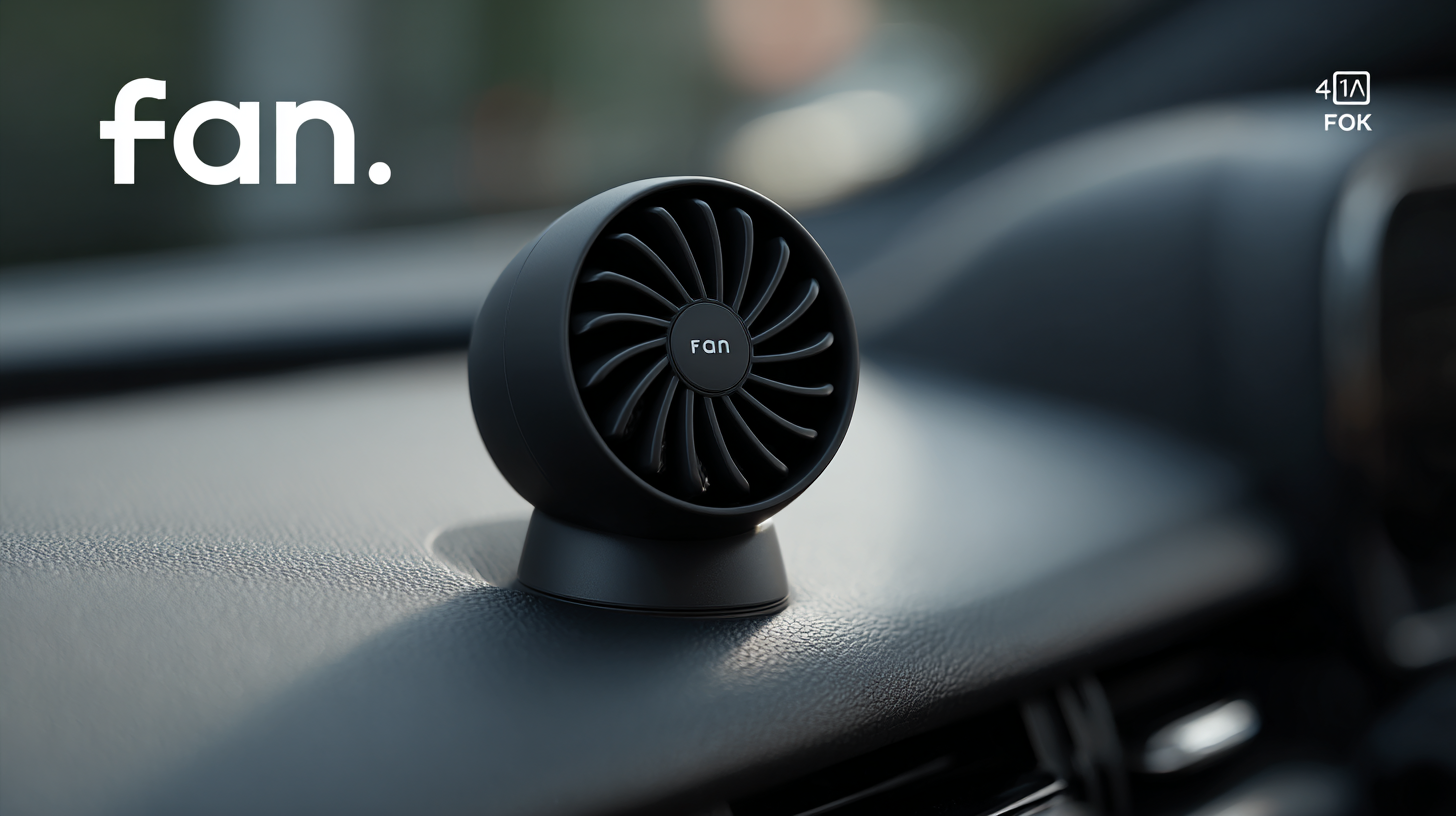As we look towards 2025, the automotive industry is poised for significant innovations, particularly in automotive climate control systems. According to recent market research, the global automotive climate control market is expected to reach approximately $34 billion by 2025, driven by the growing demand for enhanced passenger comfort and air quality. Central to this evolution is the development of advanced auto fan for car systems that not only improve air circulation but also integrate seamlessly with smart vehicle technologies. These auto fans will leverage cutting-edge materials and energy-efficient designs, aligning with sustainability goals while ensuring optimal climate management in diverse driving conditions. As consumers become increasingly tech-savvy and environmentally conscious, these advancements will play a crucial role in the future of automotive design and user experience.

The automotive industry is on the brink of a revolution in climate control technology, with significant advancements anticipated by 2025. One of the most notable trends is the integration of smart climate control systems that utilize AI and machine learning. These systems analyze passenger preferences and external conditions to optimize temperature and air quality in real-time, ensuring a personalized and comfortable driving experience. The push toward electric vehicles further accelerates the development of advanced climate solutions, emphasizing energy efficiency while maintaining user comfort.
Another key innovation is the rise of sustainable materials in climate control components. Manufacturers are increasingly focused on eco-friendly solutions, utilizing recycled and biodegradable materials for automotive fans and ventilation systems. This trend not only reflects growing environmental consciousness but also aligns with the automotive industry's broader shift towards sustainability. As a result, we can expect to see lighter, more efficient components that reduce the overall carbon footprint of vehicles, combining performance with ecological responsibility.
When selecting a high-quality auto fan manufacturer, several key considerations become crucial to ensure you invest wisely. First and foremost, it’s essential to evaluate the manufacturer's reputation and experience in the automotive industry. A company with a long-standing history and positive reviews is likely to produce reliable and efficient products. Look for manufacturers that specialize in automotive climate control systems, as their expertise will contribute to better performance and durability of the fans.
Another important factor is the technology and materials used in the production of the auto fans. As the automotive industry moves towards more sustainable practices, manufacturers that utilize eco-friendly materials and energy-efficient designs are increasingly sought after. Ensure the fans offer features like variable speed control, low noise operation, and enhanced airflow efficiency. Additionally, consider whether the manufacturer complies with industry standards and regulations, as this can impact the reliability and safety of the product in your vehicle.

In the rapidly evolving automotive industry, eco-friendly materials are set to play a pivotal role in the development of climate control systems. As manufacturers strive to reduce their carbon footprint, innovative materials such as recycled plastics and bio-based composites are increasingly being used. These materials not only minimize environmental impact but also enhance the overall performance of climate control systems. For instance, lighter materials can improve heat efficiency, leading to lower energy consumption and a smaller vehicle emission footprint.
**Tip:** When choosing a vehicle in 2025, look for models that highlight the use of sustainable materials in their climate control systems. This not only helps the environment but often results in better overall vehicle efficiency.
In addition to material innovations, manufacturers are also implementing advanced technologies that enhance the effectiveness of climate control. Smart climate control systems that adapt to external weather conditions and passenger preferences create a more comfortable driving experience. These features are increasingly constructed with eco-friendly materials to ensure sustainability throughout the entire vehicle lifecycle.
**Tip:** Consider vehicles that offer smart climate features integrated with eco-friendly systems, as they may contribute to both comfort and environmental responsibility.
As we look toward 2025, the automotive industry is experiencing a revolution in climate control technologies aimed at enhancing in-car comfort. Recent reports from Frost & Sullivan highlight that the market for automotive climate control systems is projected to grow at a CAGR of 5.3%, reaching $30 billion by 2025. This growth is fueled by emerging smart technologies that promise to personalize the driving experience and optimize energy efficiency.
One of the key trends shaping the future of in-car climate systems is the integration of artificial intelligence (AI) and machine learning. These technologies enable vehicles to learn individual preferences for temperature and airflow, tailoring the climate control settings based on user behavior. According to McKinsey, more than 60% of consumers indicate a preference for personalized experiences in their vehicles, which underscores the demand for smart climate technologies. Furthermore, the incorporation of IoT devices allows vehicles to connect with external weather data, adjusting the climate settings proactively to enhance passenger comfort even before they enter the car.
Moreover, the advancement of materials and technologies such as thermoelectric cooling systems and advanced heat pumps further enhances the efficiency of automotive climate control. With a focus on sustainability, companies like Tesla are leading the way by integrating these eco-friendly solutions. Reports indicate that these technologies can reduce energy consumption by up to 30%, making them not only a boon for passenger comfort but also for the environment. As these innovations unfold, we can expect a significant shift toward smarter, more efficient climate control systems in the automotive sector.
This chart represents the projected growth in the adoption of various automotive climate control technologies by 2025, highlighting the importance of in-car comfort.
As the automotive industry evolves, consumer preferences for climate control features are becoming increasingly data-driven. In 2025, we can anticipate a shift towards more personalized and intelligent climate control systems that cater to individual passenger comfort. Advanced sensors and machine learning algorithms will analyze users' habits and preferences to create optimal temperature settings, reducing energy consumption while maximizing comfort. This trend highlights a growing demand for technology that adapts dynamically, ensuring that every journey is tailored to the unique needs of its occupants.
Moreover, the integration of smartphone connectivity with automotive climate control systems is set to redefine convenience. Consumers are increasingly seeking seamless interaction with their vehicles, allowing them to pre-set their climate preferences before they even step inside. As a result, the best auto fans for cars in the near future will not only focus on airflow efficiency but also on compatibility with smart devices. This connectivity will empower drivers and passengers to control their environment effortlessly, enhancing the overall driving experience and making climate management an integral aspect of automotive technology innovation.

